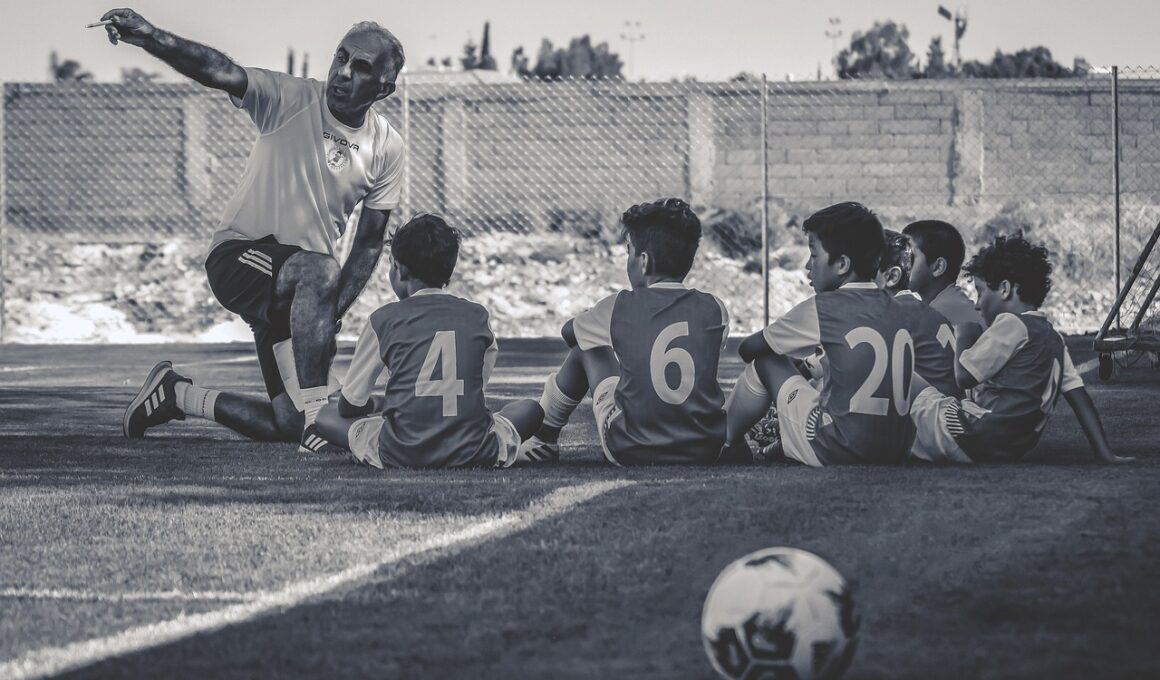Coaches’ Perspectives on Penalties and Discipline for Fair Play Violations
Coaches play a vital role in shaping athletes’ perspectives on fairness and discipline within sports. They are often the first authority figures that young athletes encounter, and their influence can significantly impact how players perceive rules and penalties. Establishing clear expectations about fair play and the consequences of violations is crucial. Coaches must communicate the importance of integrity and respect in sports, which not only enhances the game experience but also prepares athletes for challenges beyond the field. In team settings, coaches encourage discussions about fair play, allowing players to express their viewpoints about rules and consequences. This inclusive approach cultivates a culture that values honesty and accountability. Recognizing the difference between fair competition and unethical behavior is essential for athletes’ development. Moreover, coaches must themselves model ethical behavior, demonstrating how to handle disputes constructively. By emphasizing the importance of adhering to rules, coaches can facilitate better understanding among players, promoting a sense of fairness that benefits the entire team. Ultimately, with effective guidance, coaches can significantly influence how athletes embrace discipline and the importance of maintaining fair play in all aspects of their sporting lives.
In addition to teaching the rules, coaches must also be prepared to enforce penalties for violations effectively. A coach’s approach to discipline can either reinforce the importance of fair play or foster resentment among players. Thus, managing discipline involves striking a balance between being firm and understanding. For example, when a player commits a foul or displays unsportsmanlike behavior, how a coach responds sends a strong message to the team. Coaches should clearly outline the disciplinary actions that will follow specific infractions to establish expectations prior to any incidents occurring. This clarity ensures that all athletes understand the consequences of their actions, minimizing confusion and potential backlash. Applying penalties consistently across all players reinforces the idea that fairness is a shared responsibility. Furthermore, coaches should strive to make disciplinary actions educational rather than merely punitive. After enforcing a penalty, discussing the situation openly can help players reflect on their actions and learn from their mistakes. This constructive feedback loop encourages growth and understanding. Coaches who approach discipline with this mindset foster an environment where players respect the rules, learn from their errors, and are more likely to engage in fair play during competitions.
Building a Culture of Accountability
Building a culture of accountability within a team relies heavily on the coach’s philosophy regarding penalties and discipline. Coaches must create an environment where athletes feel responsible for their actions and understand that every decision carries consequences. One effective method for promoting accountability is through team discussions about expectations and the significance of fair play. When athletes are part of the conversation surrounding rules and penalties, they are more likely to embrace the guidelines established. Furthermore, this openness helps athletes realize that everyone – including coaches – can contribute to a culture of integrity. Coaches should also recognize and reward positive behavior, reinforcing the idea that fair play is valued and appreciated. By highlighting good examples of sportsmanship among players, coaches can encourage a domino effect within the team. This approach fosters an environment where respect and ethical behavior are paramount. Additionally, assigning leadership roles to players can further enhance accountability. Peer mentoring allows athletes to encourage one another in maintaining discipline and supporting each other in upholding ideals of fair play. Such strategies ultimately lead to a cohesive team that collectively values honesty, effort, and integrity in all competitive scenarios.
Coaches are often faced with challenging situations that test their commitment to fair play and discipline. For instance, disputes over fouls or questionable sportsmanship arise regularly in competitive sports settings. How coaches navigate these situations significantly impacts athletes’ attitudes towards discipline. Approaching these challenges with a calm yet assertive demeanor is crucial. Acknowledging the emotions of the moment while maintaining a focus on fair play will often help deescalate tension among players. Coaches can utilize these opportunities as teaching moments, guiding athletes to analyze their behavior and consider alternative actions. Furthermore, having a clear conflict resolution strategy ensures consistency in addressing issues. Teaching athletes to communicate openly and respectfully with opponents and officials contributes to a more sportsmanlike culture. At times, discipline may require a one-on-one interaction, allowing athletes to express their feelings without fear of reproach. These conversations can transform moments of conflict into opportunities for growth. Emphasizing the importance of resolving disputes amicably reinforces the core values of respect and fairness. Coaches who embody these principles ultimately shape athletes that not only excel in their sport but also become responsible, ethical individuals off the field.
The Impact of Coach-Athlete Relationships
The relationship between coaches and athletes significantly influences adherence to fair play practices. A strong, trusting connection often encourages athletes to embrace discipline willingly, understanding its role in enhancing their performance and integrity. Coaches who genuinely care about their players foster an environment of mutual respect and open communication. This approach enables athletes to feel secure in discussing their mistakes or uncertainties related to rules and penalties. When such a relationship is established, players are more likely to accept disciplinary actions without harboring resentment. Additionally, the way coaches respond to violations can either solidify or undermine this relationship. Using punitive measures without explanation can lead to misunderstandings and feelings of unfairness among athletes. Instead, effective coaches explain why specific penalties are necessary, linking them back to discussions about the importance of fair play and sportsmanship. Consequently, players learn to view discipline as a means of growth rather than punishment. Nurturing these relationships ultimately enhances a team’s culture, where accountability and respect are prioritized. Coaches who invest time in building strong connections with their athletes greatly influence the overall success and ethical standards within their sports programs.
Furthermore, the collective mindset of a team is influenced heavily by the coach’s view of penalties and discipline. Coaches often serve as role models for their athletes, demonstrating how to react to wins and losses alike. Observing their coaches’ actions during high-pressure situations provides valuable lessons on maintaining composure and respect towards opponents and officials, crucial parts of fair play. If a coach reacts negatively to penalties or disputes, players may adopt a similar mindset, leading to a toxic team culture that diminishes ethical standards. Conversely, demonstrating resilience and graciousness helps athletes understand the importance of respecting the spirit of the game. Coaches should actively discuss the relevance of maintaining a good attitude regardless of outcomes. By emphasizing the value of sportsmanship, coaches cultivate a mindset where athletes celebrate their achievements while respecting the game and opponents. Instilling this attitude encourages players to respond appropriately to challenges both in sports and life. Ultimately, a team’s collective identity is shaped by how the coach addresses discipline and penalties, impacting not only individual players but the entire team atmosphere and experience.
Conclusion: The Long-Term Effects of Coaches’ Influence
The influence coaches have extends far beyond the confines of a sporting event; it shapes the moral compass of athletes. By instilling the principles of fair play and ethical behavior, coaches set a foundation for their athletes to build upon throughout their lives. Young athletes learn that competitive success does not overshadow respect, honor, and fair treatment. Coaches who emphasize these values contribute to creating a generation of sports leaders who appreciate the significance of discipline in maintaining both personal integrity and team cohesion. Empowering athletes to understand the ramifications of their actions fosters a sense of responsibility that transcends sports. Future generations of players benefit from having learned these critical lessons in sportsmanship and ethics during their developmental years. The long-term effects of a strong ethical foundation can lead to lifelong respect for rules and standards outside the sports world as well. As coaches foster this understanding among their athletes, they cultivate a culture of ethical leaders who value the essence of fair play. This evolution ultimately contributes significantly to the betterment of the sports community as a whole, promoting a legacy of integrity that resonates beyond competitions.
In conclusion, coaches play a pivotal role in shaping athletes’ perspectives on fair play and discipline. Their perspectives on penalties, effective communication, and relationship-building can transform how young athletes approach sportsmanship. By prioritizing a culture of accountability and open dialogue with players, coaches can adeptly navigate the complexities of disciplinary measures while fostering an environment that values respect and ethical behavior. As crucial role models, coaches have the power to set the tone for how athletes perceive fairness in competition. They must model integrity, demonstrating both accountability and resilience in the face of challenges. Additionally, by instilling the importance of fair play in their athletes, coaches can prepare them for both victory and defeat. Encouraging athletes to reflect on their actions prepares them for future challenges and instills a sense of responsibility toward their teammates and opponents. Ultimately, the lessons learned under the guidance of a thoughtful coach have the power to shape not only the athlete’s sports career but their character and ethical behavior throughout life. Observing the long-term impact of these lessons emphasizes the importance of coaches in promoting fair play standards in all competitive environments.





